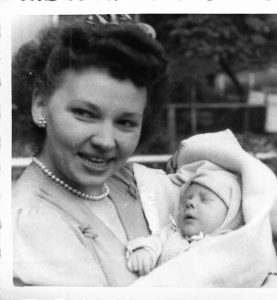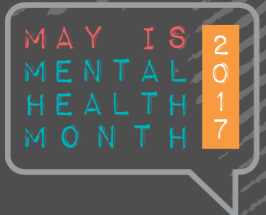It’s Mental Health Month, so I’m going to tell you of my family’s experience with mental illness, starting in the early 1940s.
 What is it like to live with a mentally ill family member when you have no support, no medication, and few options for care?
What is it like to live with a mentally ill family member when you have no support, no medication, and few options for care?
The anguish escalates when mental institutions, which should offer support and a safe place for the ill person, are, instead, suspect. The media has exposed these “warehouses for the insane” as cruelly indifferent. Or worse.
Just as your loved one spirals into a severe mental breakdown, a widely read magazine publishes a photo essay exposing how patients are mistreated, starved, or beaten in many mental asylums.
That’s the situation my parents faced.
The Life Magazine article, entitled “Bedlam” came out on May 6, 1946

Grandma K
Exactly at the time this article was published, my maternal grandmother (Grandma K, I’ll call her) was having a whole passel of delusions and other symptoms of psychosis–a mere two months before my mother was to give birth to her first child. Mom and Dad had to turn their attention away from their own happiness and anticipation of their first-born to focus on Grandma K.
Virtually no effective psychotropic meds existed to qualm the storms in Grandma K’s mind. A psychiatrist recommended Electroconvulsive Therapy (ECT – commonly known as “shock treatment”). Grandma underwent several treatments. She was released just two days before my older brother was born.
My upcoming book about my family’s life on Chicago’s West Side during the racial changes of the 1960’s includes the family’s backstory of how we came to own property there and my parents’ physical, emotional, monetary, and marital investment in that property.

Mom & my older brother
My Grandma Koroschetz (Mom’s mother) had another major psychotic meltdown just as my parents bought their first two-flat in West Garfield Park and just before their second child (me) was born. My grandmother’s mental illness played an insidious role in undermining my parents’ marriage.
They didn’t have the ready access to support systems and medication available today, or their lives would have been drastically different. In this more enlightened era, you can find help if you look.
 I encourage anyone who has symptoms of mental illness, or the loved ones of those displaying symptoms of concern, to please check out the website for NAMI (National Alliance on Mental Illness), learn more, and get support.
I encourage anyone who has symptoms of mental illness, or the loved ones of those displaying symptoms of concern, to please check out the website for NAMI (National Alliance on Mental Illness), learn more, and get support.
This is Mental Health Month. Let’s all do something to bring awareness and understanding of mental illness-and hope to the thousands who suffer and to their families.
How different my parents’ story might have been had they had access to organizations like NAMI!